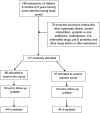Effect of Zinc Supplementation in Children with Acute Diarrhea: Randomized Double Blind Controlled Trial
- PMID: 27933128
- PMCID: PMC5139709
- DOI: 10.4021/gr2009.06.1298
Effect of Zinc Supplementation in Children with Acute Diarrhea: Randomized Double Blind Controlled Trial
Abstract
Background: To test the hypothesis that daily supplementation of zinc has any effect on clinical course of acute diarrhea, i.e. frequency of stool, on stool amount and duration of acute diarrhea.
Methods: In a randomized double blind placebo controlled trial, 117 children aged 6 months to 59 months in a medical college hospital, with acute diarrhea of less than 14 days were assigned by permuted block design 1:1 to receive intervention of zinc supplemented syrup (n = 60) or placebo syrup (n = 57).
Results: Baseline characteristics were similar in both the groups. Mean age in zinc supplemented group was 22.14 ± 16.68 months and in placebo group 25.66 ± 17.02 months. Reduction in stool frequency per day was found 62% in zinc supplemented group and 26% reduction was found in placebo supplemented group with obvious difference of 36% between these two groups from day 1 to day 3 and day 5, which was found statistically highly significant. Similarly, significant difference was observed for reduction in amount of stool per day from day 1 to day 3 and day 5 with obvious difference of 45% between the study groups.
Conclusions: Oral zinc administration in acute diarrhea reduces the frequency of diarrhea and output of stool by changing the natural course of acute diarrheal disease, causes early normalization of stool consistency, early recovery and decreases total duration of hospital stay. Zinc supplementation is simple, acceptable and affordable strategy which should be considered in management of acute diarrhea.
Keywords: Acute diarrhea; Blinding; Frequency of stool; Placebo; Randomized controlled trial; Zinc.
Figures
References
-
- Patwari AK. IAP Textbook of pediatrics 12.1 Diarrheal diseases. 2nd edition. p. 414.
-
- Walker-Smith JA, Sandhu BK, Isolauri E, Banchini G, van Caillie-Bertrand M, Dias JA, Fasano A. et al. Guidelines prepared by the ESPGAN Working Group on Acute Diarrhoea. Recommendations for feeding in childhood gastroenteritis. European Society of Pediatric Gastroenterology and Nutrition. J Pediatr Gastroenterol Nutr. 1997;24(5):619–620. doi: 10.1097/00005176-199705000-00024. - DOI - PubMed
-
- Patel AB, Dhande LA, Rawat MS. Therapeutic evaluation of zinc and copper supplementation in acute diarrhea in children: double blind randomized trial. Indian Pediatr. 2005;42(5):433–442. - PubMed
-
- Zinc investigators’ collaborative group. Therapeutic effect of oral zinc in acute and persistent diarrhea in children in developing countries: pooled analysis of randomized controlled trials. Am J Clin Nutr. 2000;72:1516–1522. - PubMed
LinkOut - more resources
Full Text Sources

